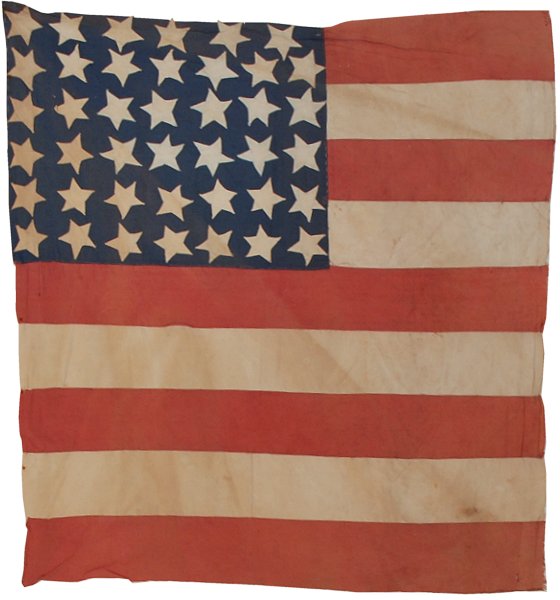
This American Flag is
special on so many counts and is highly deserving of
its place in the showcase. On almost every level,
the flag itself is a folk art masterpiece. Its
star count of 41 is exceptionally rare. Its nine stripes
are highly unusual. Its square shape, seemingly
stunted stripes of varying widths, and relatively small
size for a flag of sewn construction (just 32 inches by
34 inches) result in an appealing homemade feel. The
canton rests on the red war stripe, yet another rare
trait. And the stars of the flag, which are
single-applique, dance freely on the canton and are
stretched and asymmetrical in shape.
One might think that
this flag is an extraordinarily whimsical creation to
celebrate Montana's statehood as the 41st state on
November 8, 1889. Without provenance and a good
bit of textile examination, this would be the obvious
assumption. Yet the joy of this flag stems not
from celebrating the introduction of a new state.
This flag shows the joy felt by the people of Saone,
France following their liberation from Nazi Germany
during a period of 83 days from September 8 to November
29, 1944. This flag belongs to a rare class of
highly sought after flags known as Liberation Flags.
Collectively, they're a fascinating subset of American
Flags. They have great symbolic meaning, because they
were made by people in a very poignant international
display of appreciation for the great sacrifices
Americans made to liberate them from oppression. The
thought behind why they were made and what they
represent is as stirring a story of what the American
Flag represents as any. They are also beautiful because
of the great variation in their construction. The flags
were made from whatever material was at hand, so they
are often very folky and have a charming "make do"
quality about them. It was also very common for them to
have fewer (or even more) than the 48 stars that were
official at the time of the war. That's because while
many people know what the flag looks like in general,
they may not have known the detail of the correct star
count. So often these flags have unusual star counts or
configurations, which is the case with this flag. Regardless of which war it
was made for (WWI or WWII), 48 stars would have been
official for either. Most often, liberation flags are WWII
vintage, primarily because of the dramatic nature of the
liberation from Nazi Germany that started on D-Day at
Normandy. These flags are still cherished in France and
are still a reminder of the ties between our countries,
and are much sought after by collectors of American
Flags.
|

